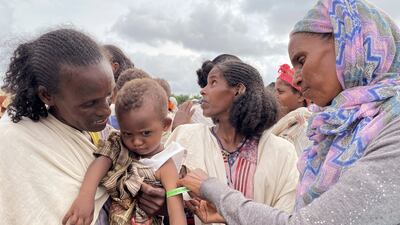The UN announced on Monday it will provide $40 million in emergency funding for conflict-wracked northern Ethiopia and drought-affected southern areas.
UN humanitarian chief Martin Griffiths allocated $25m from the Central Emergency Response Fund and the country-based Ethiopia Humanitarian Fund allocated $15m.
The UN said the funds will help scale up emergency operations to provide humanitarian assistance and protect civilians in the north as well as support an early response to the drought in the south.
“Millions of people in northern Ethiopia are living on a knife-edge as the humanitarian crisis is growing deeper and wider,” said Mr Griffiths, who returned last week from Ethiopia.
“Across the country, needs are rising. This injection of cash will help aid organisations meet some of the most vulnerable people’s need for protection and relief.”
Months of political tension in the north between Ethiopian Prime Minister Abiy Ahmed’s government and the Tigray leaders who once dominated the government exploded into a war in November 2020 that has killed thousands, displaced millions and led to thousands of detentions.
Following some of the fiercest fighting of the conflict, Ethiopian soldiers fled the Tigray capital Mekelle in June.
Tigray forces launched a recent offensive and are approaching the capital Addis Ababa to press Mr Abiy to step aside and lift a deadly months-long blockade which has cut off food, medicine and other aid from the region of about six million people.
The prime minister declared a national state of emergency on November 2 with sweeping detention powers.
In the northern Tigray, Amhara and Afar regions, the UN said the newly announced funds will support relief agencies providing protection and other life-saving assistance to people affected by the conflict.
For the southern Somali and Oromia regions, currently plagued by drought, the UN said additional funding will enable relief agencies to provide drinking water, which will help to prevent waterborne diseases and mitigate the risk of cholera outbreaks, and to assist pastoral communities in preserving their livestock.
The UN said its humanitarian operations throughout the country face a funding gap of $1.3 billion, including $350m for the response in Tigray.
SPEC%20SHEET%3A%20APPLE%20M3%20MACBOOK%20AIR%20(13%22)
%3Cp%3E%3Cstrong%3EProcessor%3A%3C%2Fstrong%3E%20Apple%20M3%2C%208-core%20CPU%2C%20up%20to%2010-core%20CPU%2C%2016-core%20Neural%20Engine%3C%2Fp%3E%0A%3Cp%3E%3Cstrong%3EDisplay%3A%3C%2Fstrong%3E%2013.6-inch%20Liquid%20Retina%2C%202560%20x%201664%2C%20224ppi%2C%20500%20nits%2C%20True%20Tone%2C%20wide%20colour%3C%2Fp%3E%0A%3Cp%3E%3Cstrong%3EMemory%3A%3C%2Fstrong%3E%208%2F16%2F24GB%3C%2Fp%3E%0A%3Cp%3E%3Cstrong%3EStorage%3A%3C%2Fstrong%3E%20256%2F512GB%20%2F%201%2F2TB%3C%2Fp%3E%0A%3Cp%3E%3Cstrong%3EI%2FO%3A%3C%2Fstrong%3E%20Thunderbolt%203%2FUSB-4%20(2)%2C%203.5mm%20audio%2C%20Touch%20ID%3C%2Fp%3E%0A%3Cp%3E%3Cstrong%3EConnectivity%3A%3C%2Fstrong%3E%20Wi-Fi%206E%2C%20Bluetooth%205.3%3C%2Fp%3E%0A%3Cp%3E%3Cstrong%3EBattery%3A%3C%2Fstrong%3E%2052.6Wh%20lithium-polymer%2C%20up%20to%2018%20hours%2C%20MagSafe%20charging%3C%2Fp%3E%0A%3Cp%3E%3Cstrong%3ECamera%3A%3C%2Fstrong%3E%201080p%20FaceTime%20HD%3C%2Fp%3E%0A%3Cp%3E%3Cstrong%3EVideo%3A%3C%2Fstrong%3E%20Support%20for%20Apple%20ProRes%2C%20HDR%20with%20Dolby%20Vision%2C%20HDR10%3C%2Fp%3E%0A%3Cp%3E%3Cstrong%3EAudio%3A%3C%2Fstrong%3E%204-speaker%20system%2C%20wide%20stereo%2C%20support%20for%20Dolby%20Atmos%2C%20Spatial%20Audio%20and%20dynamic%20head%20tracking%20(with%20AirPods)%3C%2Fp%3E%0A%3Cp%3E%3Cstrong%3EColours%3A%3C%2Fstrong%3E%20Midnight%2C%20silver%2C%20space%20grey%2C%20starlight%3C%2Fp%3E%0A%3Cp%3E%3Cstrong%3EIn%20the%20box%3A%3C%2Fstrong%3E%20MacBook%20Air%2C%2030W%2F35W%20dual-port%2F70w%20power%20adapter%2C%20USB-C-to-MagSafe%20cable%2C%202%20Apple%20stickers%3C%2Fp%3E%0A%3Cp%3E%3Cstrong%3EPrice%3A%3C%2Fstrong%3E%20From%20Dh4%2C599%3C%2Fp%3E%0A
Why are asylum seekers being housed in hotels?
The number of asylum applications in the UK has reached a new record high, driven by those illegally entering the country in small boats crossing the English Channel.
A total of 111,084 people applied for asylum in the UK in the year to June 2025, the highest number for any 12-month period since current records began in 2001.
Asylum seekers and their families can be housed in temporary accommodation while their claim is assessed.
The Home Office provides the accommodation, meaning asylum seekers cannot choose where they live.
When there is not enough housing, the Home Office can move people to hotels or large sites like former military bases.




















